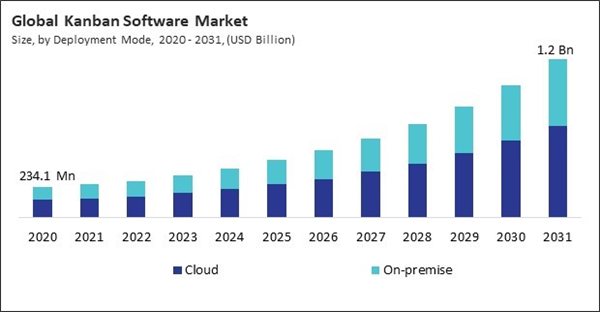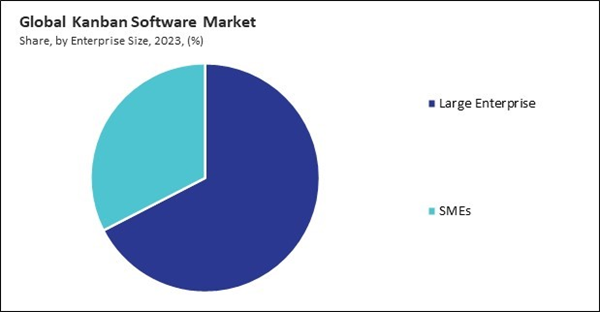Due to the widespread use of agile approaches in software development and project management, the IT and telecom industries have contributed significantly to the growth of the segment. In these industries, the need for efficient workflow management, continuous delivery, and fast-paced project cycles makes Kanban software invaluable. Kanban tools' visual and collaborative nature allows IT and telecom teams to effectively manage tasks, streamline communication, and optimize processes for improved productivity. Kanban has become widely used in this industry because of the growing need for digital transformation and quicker product lifecycles. Its ability to manage intricate and changing projects is essential. Thus, the IT & telecom segment witnessed 28% revenue share in the Kanban software market in 2023.
Kanban software has emerged as a powerful tool in this context, providing a range of automation features designed to enhance project management processes. One significant advantage of Kanban software is its ability to automate task progression. Another beneficial feature of Kanban software is the ability to automate notifications. Additionally, Kanban enables process optimization by setting limits on work-in-progress, a core principle of Lean. This helps teams avoid multitasking and reduces task overload, leading to greater focus and higher-quality outputs. By emphasizing continuous improvement, Kanban allows teams to refine workflows and adapt their processes in real-time to meet evolving project needs. Therefore, such factors are propelling the growth of the market.
However, many organizations, particularly those with established workflows and long-standing operational practices, are hesitant to embrace new methodologies and tools. This reluctance often stems from a mindset of maintaining familiarity and comfort with existing systems, where teams may have honed their processes over the years. Hence, this cultural resistance ultimately limits the market growth for Kanban software.
Driving and Restraining Factors
Drivers
- Growing remote work and digital collaboration
- Rising demand for project management automation
- Increased adoption of Agile and Lean methodologies
Restraints
- Resistance to change in organizational culture
- High costs of implementing and training staff
Opportunities
- Growing integration with other business tools
- Increasing popularity in non-IT sectors
Challenges
- Competition from alternative project management tools
- Limited awareness and understanding
Deployment Outlook
Based on deployment mode, the market is bifurcated into cloud and on-premise. The cloud segment garnered 58% revenue share in the market in 2023. Cloud-based solutions allow businesses to manage workflows from any location, a feature that became especially crucial with the rise of remote work.Enterprise Size Outlook
On the basis of enterprise size, the market is classified into large enterprises and SMEs. The SMEs segment recorded 33% revenue share in the market in 2023. Small and medium-sized businesses are increasingly adopting Kanban software to optimize limited resources and improve workflow management without incurring substantial costs.Industry Vertical Outlook
By industry vertical, the market is divided into IT & telecom, BFSI, healthcare, manufacturing, government, education, and others. The healthcare segment procured 14% revenue share in the market in 2023. Kanban software has gained traction in healthcare for its organization and management of patient care workflows, administrative tasks, and resource distribution.Regional Outlook
Region-wise, the market is analyzed across North America, Europe, Asia Pacific, and LAMEA. The Europe segment recorded 30% revenue share in the market in 2023. The Kanban software market in Europe is supported by the widespread adoption of agile and Lean methodologies in European industries, particularly in sectors such as manufacturing, IT, and financial services.List of Key Companies Profiled
- Planview, Inc.
- Apptio, Inc. (IBM Corporation)
- Kanbanchi Ltd.
- Axiom Labs Inc. (ZenHub)
- Kanban Tool (Shore Labs)
- Scrumwise ApS
- Atlassian Corporation PLC
- Smartsheet, Inc.
- Monday.com Labs Ltd.
- MeisterLabs GmbH
Market Report Segmentation
By Deployment Mode
- Cloud
- On-premise
By Enterprise Size
- Large Enterprise
- SMEs
By Industry Vertical
- IT & Telecom
- BFSI
- Healthcare
- Manufacturing
- Government
- Education
- Others
By Geography
- North America
- US
- Canada
- Mexico
- Rest of North America
- Europe
- Germany
- UK
- France
- Russia
- Spain
- Italy
- Rest of Europe
- Asia Pacific
- China
- Japan
- India
- South Korea
- Singapore
- Malaysia
- Rest of Asia Pacific
- LAMEA
- Brazil
- Argentina
- UAE
- Saudi Arabia
- South Africa
- Nigeria
- Rest of LAMEA
Table of Contents
Companies Mentioned
- Planview, Inc.
- Apptio, Inc. (IBM Corporation)
- Kanbanchi Ltd.
- Axiom Labs Inc. (ZenHub)
- Kanban Tool (Shore Labs)
- Scrumwise ApS
- Atlassian Corporation PLC
- Smartsheet, Inc.
- Monday.com Labs Ltd.
- MeisterLabs GmbH










